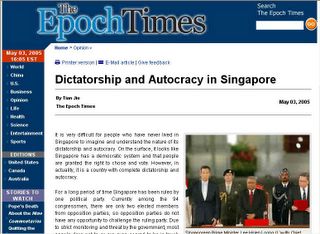

Question Number One.. Who is Tian Jie?
By Tian Jie The Epoch Times May 03, 2005
Singaporean Prime Minister Lee Hsien Loong (L)with Chief Justice Yong Pung How (R) and President S.R Nathan (C) at the Istana presidential palace in Singapore. (Roslan Rahman/AFP/Getty Images)
It is very difficult for people who have never lived in Singapore to imagine and understand the nature of its dictatorship and autocracy. On the surface, it looks like Singapore has a democratic system and that people are granted the right to chose and vote. However, in actuality, it is a country with complete dictatorship and autocracy.
For a long period of time Singapore has been rules by one political party. Currently among the 94 congressmen, there are only two elected members from opposition parties, so opposition parties do not have any opportunity to challenge the ruling party. Due to strict monitoring and threat by the government, most people dare not to or are even scared to be in touch with any of the opposition parties. They are not willing to openly support the opposition parties. Therefore the opposition parties, in the political system of Singapore, are actually just an ornament for the outside world. It is a coat of democracy covering up its nature. The small number of people who dare to step forward and challenge the government, especially those who join the opposition parties to participate in the election, will simply be brought to court in the name for “slandering the system” because of some minor public speeches or immaterial articles they wrote. The judicial system of Singapore basically obeys the government. Cases related to challenging the government or the political leaders rarely have any prospect of winning.
Members of the opposition parties, if sued, can predict that they will definitely lose their lawsuits under the judicial system controlled by the government. However, these unfortunate people, knowing clearly that they will not win, have to defend their cases again and again in court. In addition to paying expensive legal fees for the lawsuits, they also need to face a huge penalty fee in the end. The lengthy legal procedures have turned most of them bankrupt. In one of the elections in the 90s, a famous lawyer joined one of the opposition parties, the ‘Workers Party’, to participate in the election. But his public speech in an election gathering was taken out of context. He was sued by many members of the ruling party. That lawyer, in order to escape from the political persecution, left Singapore and settled down in Australia.
In the one or two districts of the opposition parties, people living there can feel the pressure and boundaries. For example, the development of civil construction, education and even transportation is all under control of the districts of the ruling party. This is equivalent to silent revenge and suppression. Due to these reasons, several former districts of the opposition parties were forced to vote for the candidates of the ruling party in the election. It is therefore more and more difficult for the opposition parties to maintain their foundations.
Singapore used to be totally against communism. Since late 1980s, it established a diplomatic relationship with China and has become closer and closer to the Chinese Communist Party (CCP). It now completely follows the CCP, seeks benefits from the CCP and conducts acts that are in the interest of the CCP. It is not hard to understand why the government of Singapore, disregarding its own image, has committed an evil deed by bringing two innocent Falun Gong practitioners to court and heavily punishing them for letting tourists and policemen know the truth of Falun Gong.
There are two major media organizations in Singapore. One is a newspaper organization, controlling all the newspapers in Singapore; and the other is a television organization, controlling most of the TV stations. Although the two groups are run independently on the surface, they are actually heavily influenced by the government. It is rare to hear the voice of the opposition parties in local media. The opinions from the opposition parties are always put in the least obvious and the hidden places. It is rare to see or to hear dissatisfaction or negative comments toward government policies or leaders. In addition, the media in Singapore is heavily influenced by the CCP. Accordingly, The Singapore United Times is the only overseas paper that is present in Mainland China. Even papers that are heavily influenced by the CCP, such as The Xing Pao Daily and The Ming Daily of Hong Kong and The World Daily of Taiwan, can not compare with it. In this situation, The Singapore United has to completely conform to the CCP. Any news that the CCP does not like cannot be published. There is absolutely no news of the CCP’s brutal persecution toward members of the democratic movements, Christians and Falun Gong members. A friend of mine told me once that he met one of the editors. He found out that the Chinese Embassy provides articles to The Singapore United on a regular basis. The Singapore United is obliged to publish these articles and is forbidden to publish other articles, otherwise the paper would be banned in Mainland China. Once in a while, if the paper published some articles by mistake that the Chinese Embassy did not want to see published, the ambassadors would be furious. They would threaten the paper and then entice them with material benefits.
I did not plan to write this story but in the end decided to do so since I could not bear to see that these evil deeds committed by the Singapore government go uncovered.
No comments:
Post a Comment